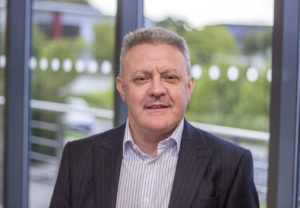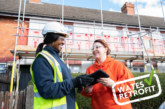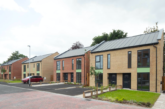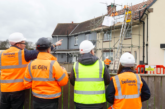 With the 27th UN Climate Conference taking place and the ongoing energy crisis impacting social housing tenants more than most, the need to create energy-efficient homes is more urgent than ever. Tony Cahill, Executive Director of Property for Livv Housing Group, explains some of the ways housing associations can deal with the challenges they face.
With the 27th UN Climate Conference taking place and the ongoing energy crisis impacting social housing tenants more than most, the need to create energy-efficient homes is more urgent than ever. Tony Cahill, Executive Director of Property for Livv Housing Group, explains some of the ways housing associations can deal with the challenges they face.
COP27 is currently underway in Egypt and it’s a reminder for us all that the clock is ticking for the UK to meet the challenge of net zero carbon emissions by 2050.
In the Liverpool City Region, we aren’t afraid of challenges. Our region was the first in the country to formally declare a climate emergency and set a target to be carbon neutral by 2040. Homes account for 20% of all UK emissions, and as one of the largest housing providers in the region, with almost 13,000 homes, and dozens of corporate buildings, our role in achieving that target is pivotal. No one doubts the monumental task of achieving net zero emissions in our homes, but how do we get there?
We believe in being bold, ambitious, and innovative in our approach to helping our customers and the environment and by sharing our knowledge and insights we can work together to create a cleaner, greener, healthier planet. We are four years into our net zero journey, having started implementing our long-term net zero plan in 2018. The Government has set a target that all homes should have an energy performance certificate (EPC) rating of C or above for all fuel-poor homes by 2030 and for all homes by 2035. We set ourselves a target to achieve this by no later than 2025.
There’s clearly a way to go nationally. The latest ONS data shows that at the end of March 2022, only 43% of all existing homes in England are rated C or above. We are proud to say that to date, we have achieved that on more than 75% of our homes.
Heating costs
Our homes are predominantly in Knowsley, the second most deprived borough in the country, and we have prioritised retrofitting those which are fuel-poor. The ongoing energy crisis means that an estimated 6.7 million homes are potentially in fuel poverty according to National Energy Action. Therefore, it has never been more important to help our customers who are struggling the most with reducing the cost of their heating.
To get our homes to EPC C, we’ve done two things. First, we’ve improved thermal efficiency through things like loft, wall or floor insulation, helping to make homes cost less to run. And secondly, we focussed on energy-efficient boilers. Last year, in those properties at greatest risk of fuel poverty, we replaced 937 boilers with modern A+ rated condensing boilers saving customers up to £400 a year on their bills.
By the end of March 2023, we will have invested another £4m, with funding from the Social Housing Decarbonisation Fund, through the Liverpool City Region Combined Authority, and our own investment, in retrofitting work. So, we have made some strides. But there is still a long road ahead. To get to net zero, our belief is that tackling the issue through the intelligent use of data is fundamental.
EPC data
Working with our energy assessors, we have gathered the EPC data on every one of our homes. Pulling this intelligence together has helped us to create a detailed roadmap of what we need to do to make every home achieve net zero. We now know exactly what energy measures are currently installed in each of our homes and what features they need to become net zero. And, crucially, how much this will cost.
Having EPC data for every home isn’t something we think other social housing providers have completed yet, but we believe this data pool is essential to establish a clear baseline position and to help devise a robust investment plan.
We are also working with our software providers to create an automated system which contains the EPC data of each home, which updates each time a feature in the property is changed to automatically recalculate the EPC certificate SAP rating. Doing this will help to create a live, accurate programme of work needed to deliver net zero.
In our journey to achieve net zero, from 2025 we anticipate we will be investing a further £120m, which is additional to the money we would spend anyway to maintain and improve our homes. To get there, innovation and collaboration will continue to be key. It’s a fundamental part of our practice, whether working with academia or small family businesses.
Greater collaboration
We have collaborated with businesses supported by the Low Carbon Eco-Innovatory team at Liverpool John Moores University for several years now and this partnership has been crucial for the research they do, as well as partnering on innovative ideas.
One product trial we have just completed with the help of the university is an eco-window blind called the ‘Flutter Shutter’, developed by a small company comprising three sisters based in south Liverpool. The blinds are designed to stop up to 70% of heat escaping through windows, made from a combination of materials including 97% natural wood harvested from managed forests. Following our successful trial, the product has now been given a formal energy performance rating and we expect it to become more widely available on the market for other housing providers to use.
What is clear is that the journey to net zero requires multiple solutions to be delivered in stages.
We are in a race against time to save our planet from the threat of climate change. It will not happen overnight and it won’t be easy, but by focusing on data, innovation and working together we can embrace the changes that are necessary.
Header image Rafael Henrique/AdobeStock









